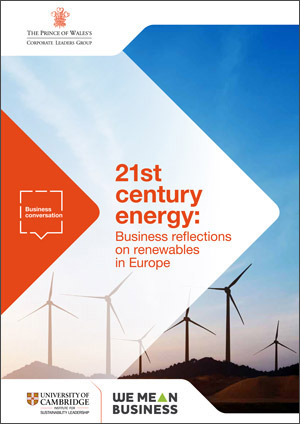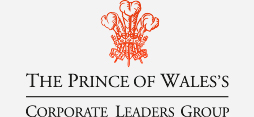
April 2017 – This report brings together business stories and interviews with companies with an interest in renewable energy. It focuses on EU policies on renewable energy and industry’s role in innovating to deliver it.
About
 In October 2014, the EU Council agreed a 2030 framework for climate and energy, which included a proposed renewables target of 27 per cent of energy consumption drawn from renewable energy sources by 2030, building on the EU’s previous target of 20 per cent by 2020.
In October 2014, the EU Council agreed a 2030 framework for climate and energy, which included a proposed renewables target of 27 per cent of energy consumption drawn from renewable energy sources by 2030, building on the EU’s previous target of 20 per cent by 2020.
As the EU implements its 2030 framework it does so in the context of a number of challenges, including the impact of the UK’s decision to leave the EU, concerns about migration and populism, and a number of key national elections. As a result, climate and energy issues risk slipping down the EU’s agenda.
However, EU Member States remain committed to the 2030 framework and to the Energy Union initiative, which has been developed by the European Commission to update EU energy policy. Proposals for new EU legislation on renewable energy in particular have been subject to significant criticism from some Members across all stakeholder groups for the low level of ambition and the lack of binding Member State commitments.
This report was commissioned to gather views from a number of business sectors on the effectiveness of EU renewables policy in encouraging business to generate or use renewable energy, and how this could be improved for a new directive.
Of the 15 companies and business organisations sharing their views on these questions, many are known as pioneers for sustainability or ‘green’ business, and many are from sectors that would not obviously see direct benefits in transitioning to renewable energy. For most, the issue of energy production and supply is far from their core business and expertise, which makes the different approaches taken to tackling this area so interesting.
Some have taken direct action, moving into renewable energy generation, not only for their own consumption but also for the market, thereby diversifying their business model. Others have been content to leave production to established providers, but sought to ensure their own consumption is beyond reproach. They have tried to stimulate demand in the market by requiring renewable energy provision when tendering. We have highlighted some of the different approaches companies are adopting in the ‘How are companies innovating?’ section of this report.
Participants
ACCIONA, Anglian Water, BT, Doosan Babcock, DSM, EDF Energy, Eurelectric, GSK, Google, IKEA, Group, Interface, LafargeHolcim, Philips Lighting, Sappi, Stora Enso
Executive summary
We invited 15 companies and business organisations to share their experiences with renewable energy and the innovation within their organisations, and interviewed them on the European context in which they operate. These companies together represent a cross-sectoral group of industries. Discussions explored the decisions taken on renewables and what the business drivers had been that prompted those decisions. Interviewees were asked if and how the existing Renewables Directive had affected corporate policy, whether the measures it contained were effective in achieving its goals, and how future Directives could best facilitate further action.
A common message from these discussions was a desire for a more ambitious, consistent, and co-operative approach to renewables policy, and a wish to see Europe lead on innovation in this area. Companies reported frustration with policies that they perceived as inconsistent, unenforced, and unambitious. They identified low levels of national and regional co-operation, and an absence of a coherent framework within which to plan future operations.
Other key insights included:
• Most companies interviewed welcomed bold targets.
These are seen as a good way of delivering results in the private sector, while unambitious targets were felt less likely to drive business investments. Proponents of stronger targets argued that they must be high enough to prompt action and intervention, not merely predict where business as usual will end up.
• Some interviewees argued that success depends on giving everyone a clear mandate.
These interviewees believe Member State commitments should continue to be part of the solution, because the absence of binding targets on renewable energy devalues policy ambitions and creates an environment where investments are perceived as risky.
• In a number of interviews, there was a clear recognition that greater consistency is needed in renewables policy between, and within, countries in Europe.
Europe’s Energy Union needs a common framework for cross-border co-operation that includes standard market design, templates for regional co-operation, and measures for enforcement.
Many of the companies interviewed felt they could easily absorb the current level of ambition for transitioning to renewable energy, and see the potential for doing much more if the EU would step in to rationalise the current landscape of conflicting policy and regulation. A clearer and more ambitious policy landscape will provide much-needed confidence that can enable business investment and take EU renewable energy supply to significantly greater levels.
In contrast to other companies interviewed, EDF Energy would like to see a progressively reduced emphasis on technology-specific targets (such as renewables) and a greater commitment to using a strong carbon price to drive the development of the lowest cost, low carbon energy solutions.
Citing this business conversation
Please refer to this publication as University of Cambridge Institute for Sustainability Leadership (CISL). (2017). 21st century energy: Business reflections on renewables in Europe, Cambridge, UK: The Prince of Wales’s Corporate Leaders Group.






